ARTHUR DONG
曾奕田
Arthur Dong is an Oscar® and Emmy-nominee, and a Peabody and triple Sundance award-winning filmmaker, author, and curator whose work center Asian American and LGBTQ stories.
FILMMAKER: Arthur Dong’s films examine themes of personal resilience and defiance in the face of societal and cultural oppression, a focus that began with Public, produced when he was just 16 years old.
Dong’s investigations into anti-gay prejudice are captured in the films Family Fundamentals, Licensed to Kill, Coming Out Under Fire, and Out Rage ’69. His films about Chinese American experiences include Hollywood Chinese, Forbidden City, U.S.A. and his earlier short works Sewing Woman and Living Music for Golden Mountains. In The Killing Fields of Dr. Haing S. Ngor, Dong chronicles the life of a Cambodian Chinese genocide survivor who became the first Asian male to win an Oscar® for Best Supporting Actor.
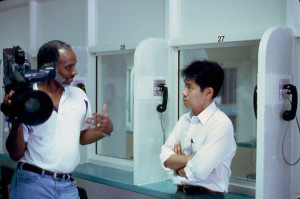
Cameraman Robert Shepard and Arthur Dong on location for “Licensed to Kill” at Robertson Correctional Unit in Abilene, TX. Photo by Angi Rosga. ©1997 DeepFocus Productions, Inc.
AUTHOR: Arthur Dong has transformed the extensive research behind his documentaries into award-winning publications that further illuminate his subjects.
His first published full-length book, Forbidden City, USA: Chinatown Nightclubs, 1936-1970 (2015, DeepFocus Productions, Inc.), features a foreword by bestselling author Lisa See and has garnered multiple accolades, including the American Book Award, the Independent Publisher’s IPPY Award, and the Art Deco Historic Preservation Award. Prior to this, Dong contributed as editor and writer for exhibition catalogues accompanying museum shows he curated.
Dong’s book, Hollywood Chinese: The Chinese in American Feature Films (2019, Angel City Press), draws from over 2,000 pieces of movie memorabilia collected during his childhood and the decade-long research for his documentary Hollywood Chinese. The book, with a foreword by Randy Haberkamp and an afterword by Janet Yang, earned the Asian/Pacific American Literature Award and was named a Critic’s Choice by Kenneth Turan of the Los Angeles Times. It was also included in The Advocate’s list of “13 Smart Must-Read Books on Race and Hate.”
Currently, Dong is working on his third book, Grandview Film: Cinematic Crossings with Joseph Sunn Jue (working title). This project will continue his exploration of Chinese American visual history, focusing on lesser-known stories of Chinese American artists.
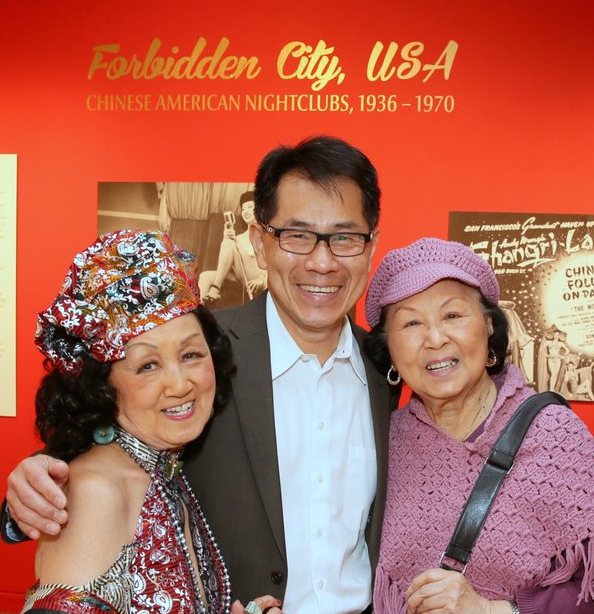
Opening day at the “Forbidden City, USA” exhibition, with (l-r): dancer Coby Yee, filmmaker/curator Arthur Dong, and dancer Fawn Leong. Photo by Frank Jang.
CURATOR: In addition to his films and books, Arthur Dong has curated exhibitions that showcase his extensive archive of cultural artifacts and ephemera. His shows include Chop Suey on Wax: The Flower Drum Song Album at the Chinese Historical Society of America Museum in San Francisco, Hollywood Chinese: The Arthur Dong Collection at the Chinese America Museum in Los Angeles, Forbidden City, USA: Chinatown Nightclubs at the Jewett Gallery in the San Francisco Public Library, and Hollywood Chinese at the Formosa, an ongoing display at the iconic Formosa Cafe in West Hollywood.
In 2022, The Criterion Channel commissioned Dong to curate a film series inspired by his Hollywood Chinese documentary and book, which streamed from August to October. In November of the same year, the Academy Museum of Motion Pictures hosted a live, in-person presentation of the series, titled Hollywood Chinese: The First 100 Years.
TELEVISION: Arthur Dong’s first corporate media job was in 1982 at KGO-TV, the San Francisco ABC affiliate, where he worked as an associate producer in the news department’s Special Projects division. From 1991-1992, he produced eleven documentaries for Life & Times, the flagship news program of KCET, Los Angeles’s PBS affiliate. For PBS’s first national series on LGBTQ issues, The Question of Equality, Dong directed the premiere episode, Out Rage ’69, which explored the historic Stonewall Riots in New York City.
Dong’s documentaries have been broadcast on signature PBS series such as American Experience, American Masters, and P.O.V. Beyond PBS, Dong’s films have reached audiences through domestic platforms like The Criterion Channel, the Sundance Channel, the Learning Channel, and Comcast, as well as international broadcasts in countries including Australia, Brazil, Canada, Finland, France, Germany, Israel, Italy, Japan, the Netherlands, Portugal, Taiwan, and the United Kingdom.
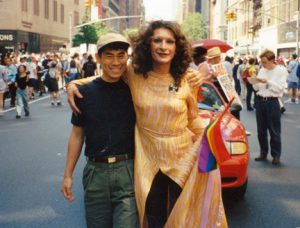
Arthur Dong with original Stonewall Riots participant, Sylvia Rivera, during the Stonewall 25 celebration in New York City, 1994. Photo by Young Gee. ©2017 DeepFocus Productions, Inc.
FILM EXCELLENCE AWARDS & HONORS: Arthur Dong has earned over 150 awards, including an Oscar® nomination, the George Foster Peabody Award, three Sundance Film Festival awards, the Berlin Film Festival’s Teddy Award, Taiwan’s Golden Horse Award, two consecutive GLAAD Media Awards, and five Emmy nominations.
In 2007, San Francisco State University honored him as Alumnus of the Year, recognizing “his continued success in the challenging arena of independent documentary filmmaking and his longstanding commitment to social justice.”
Dong received the OUT 100 Award from OUT magazine in 1998 for “waging a one-man anti-violence project” with his documentary Licensed to Kill, which examines convicted murderers of gay men. In 2015, Equality Forum named him an LGBT History Month Icon, and in 2016, Pride LA recognized him as a Community Pioneer. OutFest selected Dong as an “Architect of OutFest” in 2022.
Arthur Dong’s contributions to the Asian American community have also been widely recognized. He has received the Pioneer Award from the Organization of Chinese Americans, the Asian American Media Award from Asian CineVision, the Historian Award from the Chinese Historical Society of America, the Steve Tatsukawa Media Award from Visual Communications, the History Maker Award from the Chinese American Museum, and the Golden Spike Award from the Chinese Historical Society of Southern California.
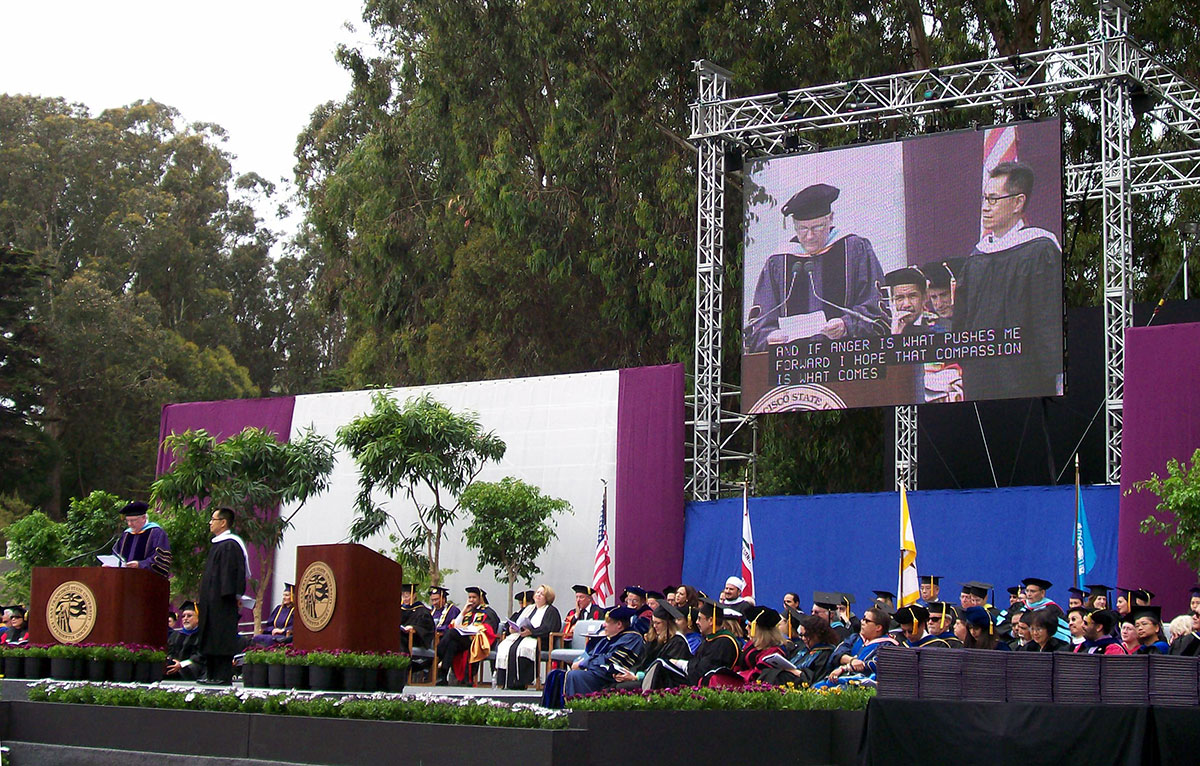
Arthur Dong receives the 2007 Alumnus of the Year Award at San Francisco State University. Photo by Marlon Hom.
FUNDING: Funding for Arthur Dong’s work has been received from the National Endowment for the Humanities, the National Endowment for the Arts, the Ford Foundation, the Soros Documentary Fund, the Sundance Institute’s Documentary Film Program, the John D. and Catherine T. MacArthur Foundation Initiative, the Independent Television Service (ITVS), the Center for Asian American Media, the Corporation for Public Broadcasting, American Documentary, the Hugh Hefner Foundation, Cal Humanities, the American Film Institute, the Unitarian Universalist Association, among many others.
Dong’s mastery of filmmaking has earned him a Guggenheim Fellowship in Film, two Rockefeller Media Arts Fellowships, and recognition as a Sundance Documentary Fellow.
DISTRIBUTION: Arthur Dong’s films have been widely distributed in theaters across the United States and showcased at film festivals worldwide. These include the Sundance Film Festival, Berlin International Film Festival, Toronto International Film Festival, Hong Kong International Film Festival, Golden Horse International Film Festival, International Documentary Film Amsterdam, Sydney International Film Festival, Gotesburg International Film Festival, Morelia International Film Festival, and others.
RESTROSPECTIVES of Dong’s work have been presented at the Human Rights International Film Festival in Warsaw, Poland, the Walker Art Center, the Hawaii International Film Festival, and Outfest. For the 2012 CNEX Documentary Film Festival in Taipei, Dong was invited as their Filmmaker in Focus, and in 2015, he was bestowed with Spotlight tributes at CAAMFest, the Los Angeles Asian Pacific Film Festival, and the New York Asian American International Film Festival. That same year, the U.S. Embassy in Phnom Penh sponsored a 10-day, 4-city Cambodia tour of Dong’s film, The Killing Fields of Dr. Haing S. Ngor.
From October 2021 through March 2022, The Criterion Channel streamed a retrospective of seven films by Dong in the series “Stories of Resistance: Documentaries by Arthur Dong.” Kino Lorber commemorated Dong’s oeuvre with the 2024 release of ten films in three Blu-ray collections: “The Arthur Dong Collection,” “Arthur Dong’s Asian American Stories,” and “Arthur Dong’s LGBTQ Stories.”
EARLY YEARS: Arthur Dong was born and raised in San Francisco’s Chinatown, where the 1970s marked a formative period of artistic exploration for him. His journey into filmmaking began in 1970 with two Super-8 films: Dance of the Lion, a documentary capturing Chinese New Year celebrations, and Public, an animated short critiquing societal norms and violence. These projects emerged from a pioneering film production program at Galileo High School, where Dong has been inducted into the Hall of Merit (now Galileo Academy of Science and Technology).
In the immediate years following, Dong expanded his artistic pursuits, studying photography and ceramics, performing traditional Chinese music with the Flowing Stream Ensemble, and hand painting signs at Cost Plus Imports.
By 1979, he enrolled at San Francisco State University’s School of Cinema where he directed Living Music for Golden Mountains, a film about his Chinese music teacher. He followed-up with Sewing Woman, a documentary detailing his mother’s immigration to America from China. Clocking in at 14-minutes and made for under $2,000, the film went on to garner an Academy Award® nomination for best short documentary.
The success of Sewing Woman inspired Dong to establish DeepFocus Productions in 1982, a company dedicated to developing, producing, and distributing his work. Two years later, he was selected as a directing fellow at the American Film Institute’s Center for Advanced Film Studies, prompting his move to Los Angeles, where he continues to reside and create.
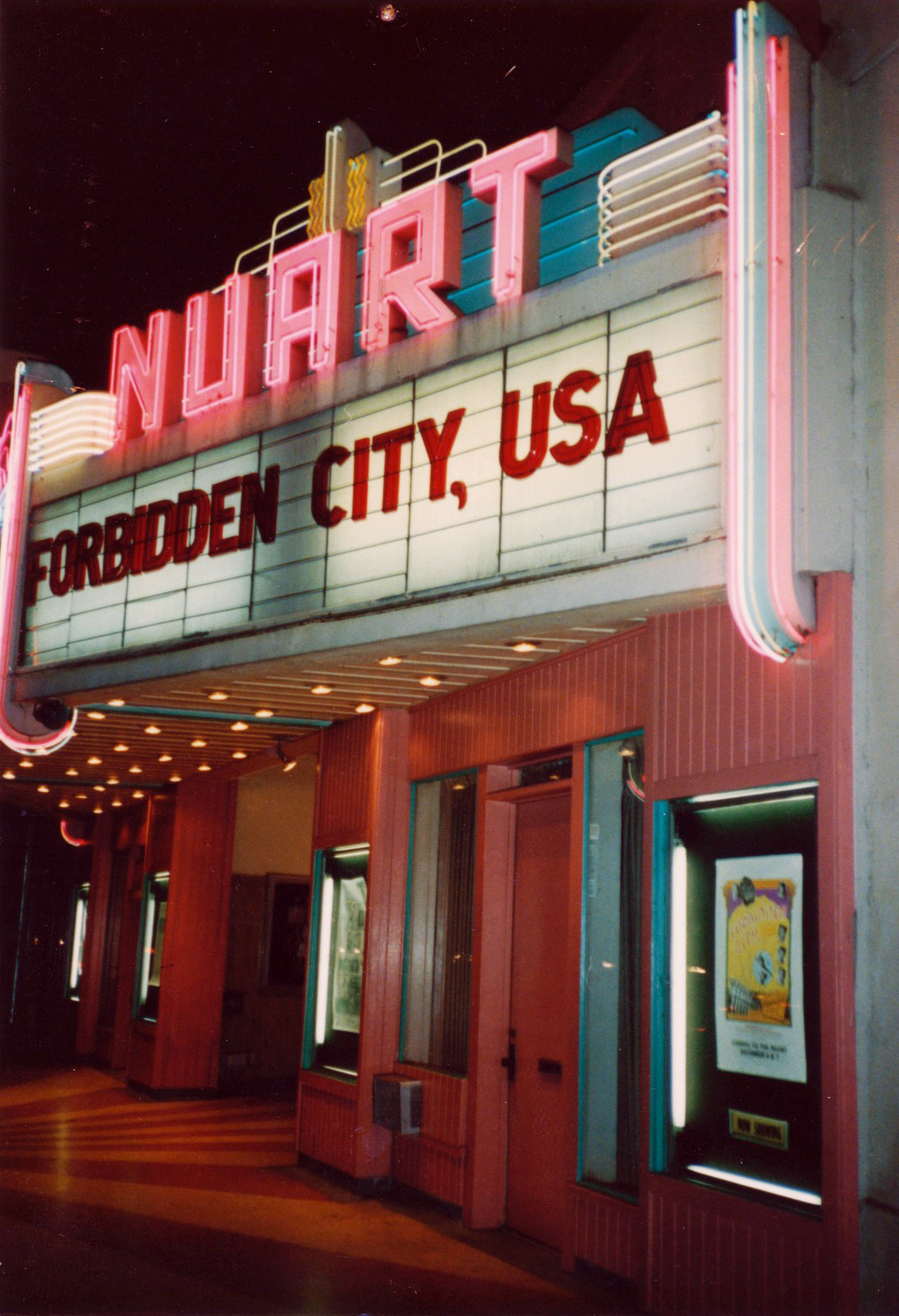
Nuart Theatre marquee for the theatrical run of “Forbidden City, USA” in Los Angeles. ©1989 DeepFocus Productions, Inc.
BUILDING COMMUNITY: During the height of the AIDS epidemic in the 1980s and 1990s, Arthur Dong worked to foster dialogue between the Asian American Pacific Islander (AAPI) and LGBTQ communities. To bridge these groups, which rarely collaborated at the time, he offered premieres of his films on the condition that organizations from both communities partnered to host the events.
For the premiere of Forbidden City, USA, Dong brought together the Asian Pacific AIDS Coalition and the National Asian American Telecommunications Association (now CAAM, the Center for Asian American Media) to organize a black-tie event attended by 1,000 patrons.
Similarly, for the premiere of Coming Out Under Fire, Dong united the Asian American International Film Festival (now CAAMFest) with Frameline’s San Francisco International LGBTQ Film Festival. The event, held at the iconic Castro Theatre in San Francisco’s LGBTQ heartland, attracted a sold-out audience of 1,400. This groundbreaking collaboration marked the first time CAAMFest hosted a screening at the Castro Theatre, paving the way for the festival to regularly feature LGBTQ films in its programming.
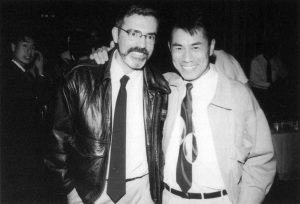
Author Allan Berube, left, with filmmaker Arthur Dong at the Castro Theatre premiere of “Coming Out Under Fire.” Photo by Rink.
BOARD MEMBER: Arthur Dong has contributed to the film industry through his leadership and advocacy roles. He has served on the boards of the Academy of Motion Picture Arts and Sciences, Film Independent, Outfest, and the National Film Preservation Board of the Library of Congress.
At the Academy, Dong played a key role in establishing the Documentary Branch in 2001, serving as one of its original architects and leading advocates. While producing Hollywood Chinese, Dong collaborated with the Academy Film Archive to recover and restore The Curse of Quon Gwon (1917), the earliest known Chinese American feature film. Since 2017, he has served as a founding member of the Academy Museum’s Inclusion Advisory Committee, offering strategic guidance on diversity and representation.
Additionally, during his tenure on the National Film Preservation Board, Dong successfully nominated and championed the induction of two landmark Asian American films into the National Film Registry: The Curse of Quon Gwon and Flower Drum Song.
JUROR: Dong has been invited to serve as a juror for the Sundance Film Festival, the International Documentary Festival at Amsterdam, the Morelia International Film Festival, the Los Angeles Film Festival, Outfest, and others. As a member of the Academy of Motion Picture Arts and Sciences and the Academy of Television Arts and Sciences, he votes for the Oscars® and Emmys.
ACADEMIA: Dong has taught documentary for over 25 years, including as Distinguished Professor in Film at Loyola Marymount University. He has also taught at Emory University, San Francisco State University, University of Hawaii, University of North Texas, UC Santa Barbara, University of Texas, the CNEX Doc Academy in Taiwan, the Sundance Documentary Workshop in Beijing, and the Sundance Music and Sound Design Lab at Skywalker.
Dong earned a B.A. from San Francisco State University’s School of Cinema Arts in 1982, graduating summa cum laude. He was named Alumnus of the Year in 2007 and inducted into the university’s Hall of Fame the same year. Additionally, he was a fellow in the Directors Program at the American Film Institute, earning a Certificate of Completion in 1985.
BOOK REFERENCES: Arthur Dong is profiled in the publications listed below, in addition to numerous periodicals, including: Advocate, Boston Globe, Cineaste, Dallas Morning News, Indiewire, Los Angeles Times, New York Times, Los Angeles Times, Mother Jones, Out, Queer Review, RogerEbert.com, Salt Lake Tribune, San Francisco Chronicle, Village Voice, and the Washington Post.
- Chinese Americans: The History and Culture of a People (more info)
- Documentary in Action (download PDF)
- Film Quarterly: Asian American Film at Fifty (download PDF)
- Hostile Climate: Report on Anti-Gay Activity (more info)
- Independent Film Distribution (more info)
- Screening Reality: How Documentary Filmmakers Reimagined America (more info)
- Travels in a Gay Nation: Portraits of LGBTQ Americans (more info)
- The View from Here: Conversations with Gay and Lesbian Filmmakers (more info)


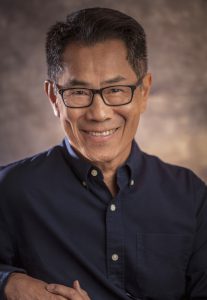
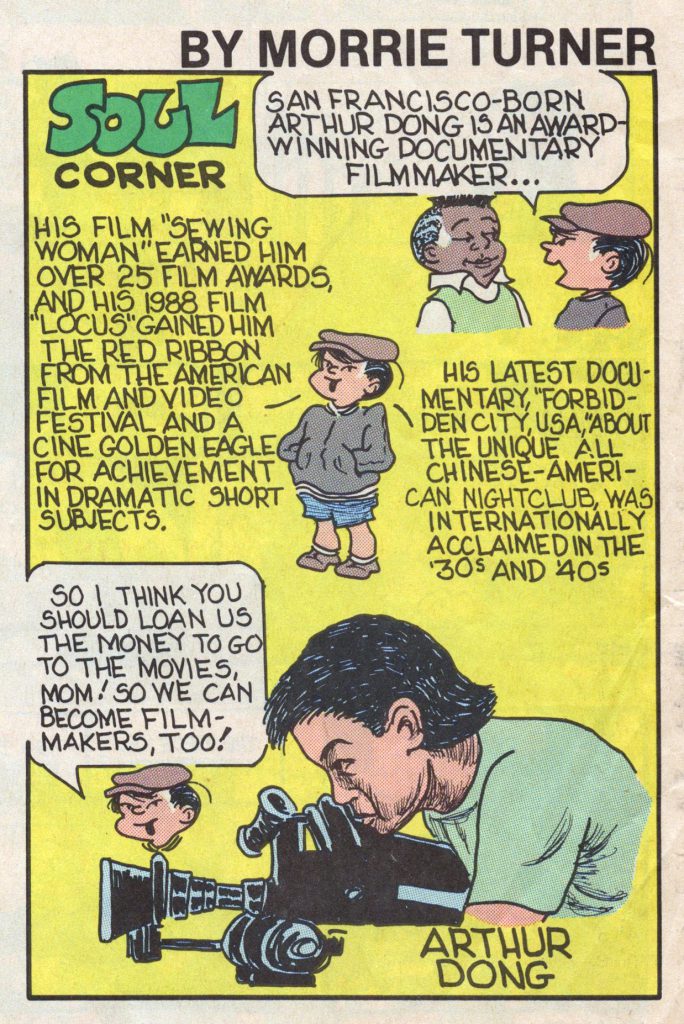
Follow Us